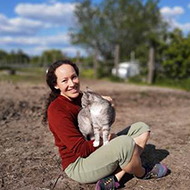
Dr Irene Camerlink awarded Young Animal Welfare Scientist of the Year 2020.
Animal welfare charity the Universities Federation for Animal Welfare (UFAW) has named Dr Irene Camerlink as winner of the 2020 UFAW Young Animal Welfare Scientist Award.
The Young Animal Welfare Award pays recognition to young scientists who have made significant improvements to the welfare of animals. It is open to postgraduate students anywhere in the world currently studying for a doctoral degree or who are within six years of completing their PhD.
Dr Camerlink, currently an assistant professor at the Polish Academy of Sciences, received the honour in recognition of her exceptional work to improve pig welfare.
Through her work on pig aggression at Scotland's Rural College (SRUC), she made extensive contributions to the study of the social behaviour of pigs and is now an internationally respected researcher in this field.
Dr Camerlink also has an impressive track record of more than 40 papers in peer-reviewed journals and is considered by her colleagues to be an outstanding mentor for students.
Professor Jean-Loup Rault from the University of Veterinary Medicine in Vienna, who nominated Dr Camerlink for the award, said: “In addition to possessing excellent scientist skills, Irene is really driven by the wish to make a change to animal welfare in practice. This is best illustrated by the regular articles that she writes in producer or non-specialist journals to disseminate knowledge in regard to pig welfare and practical means to improve it.
“This, in my opinion, is Irene’s greater skill on which she excels, and for which we need more people like her to help translate scientific knowledge into animal welfare improvements in the field”.
The UFAW judging panel also awarded a Highly Commended to Dr Fay Clark in recognition of her excellent work in the field of zoo animal welfare. Dr Clark is a lecturer in animal behaviour and welfare at Bristol Zoological Society.
The awards were virtually presented to both Dr Camerlink and Dr Clark at UFAW’s Recent Advances in Animal Welfare Science VII virtual conference on the 30 of June.
UFAW’s Chief Executive, Dr Huw Golledge, said: “One of UFAW’s missions is to help encourage the next generation of animal welfare scientists and I am delighted that we have been able to acknowledge the work of these inspiring early-career researchers. Both Irene and Fay are excellent examples of researchers who really are using Science in the Service of Animal Welfare, I look forward to following their careers.”
Image (C) UFAW.



 The Animal and Plant Health Agency (APHA) has updated its online reporting service for dead wild birds.
The Animal and Plant Health Agency (APHA) has updated its online reporting service for dead wild birds.